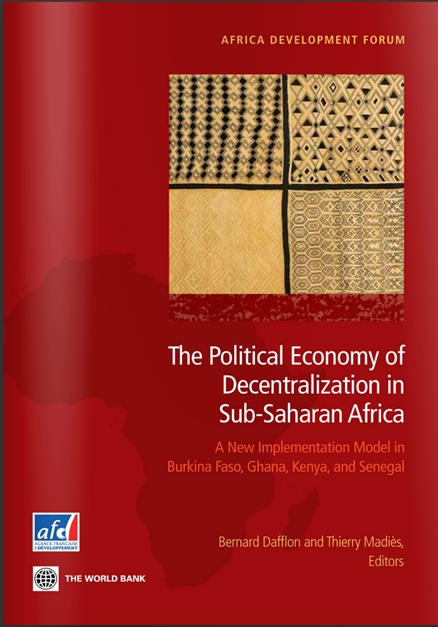The Political Economy of Decentralization in Sub-Saharan Africa
Details

This publication from 2011 is part of a series of studies in joint-collaboration between the French Development Agency and the World Bank, dedicated to the main social and economic challenges of development in Africa.
For two decades now - in fact, ever since, the splintering of the former Communist Bloc - experiments in decentralization and federalization have been developing in a large number of countries, not only in the formerly communist states of Eastern Europe but also in Asia and Africa, each time raising the same questions: What real responsibilities should be assigned to the decentralized tiers of government? What concomitant own resources, what transfers, and what equalization mechanisms should be maintained or introduced?
The decentralization policies implemented in developing countries over the past 20 years or so are part of this process. They have changed - and are still changing - the institutional landscapes in these countries. Many of the powers previously in the hands of the central governments or its decentralized structures have been transferred to decentralized levels of government. Additionally, in a recent but increasingly widespread trend, local governments are gradually emerging as development actors and are now being assigned responsibilities for territorial development.
Whatever the reasons governing a decentralization process, the transfer of new functions to the local government layer can be substantive, at least in intent. This raises a second set of questions: What are the origins and causes of these moves towards greater decentralization? Does actual decentralization on the ground coincide with the decentralization intended - as written in constitution or law? How can gaps between intended and actual decentralization be explained? Does the existing institutional design hinder decentralization, or can it be rethought and reformed to encourage even deeper decentralization?
The book pays a great attention to issues related to funding, the 3rd phase of the authors' approach to decentralization:
To complete the decentralization process, it is not enough to distribute funds or budget grants. The allocated resources must be firmly grounded within a budgetary system that will ensure the long-term sustainability of local government funding and create conditions conductive to the financial accountability of local elected officials. From this perspective, it is imperative to set up the operational logistics for a budgetary, fiscal, accounting, and administrative system, not only for technical reasons but also for the sake of economic analysis, which makes it possible to measure and assess the progress, performance and effects of decentralization.













